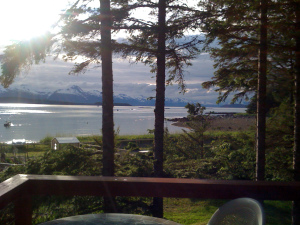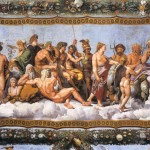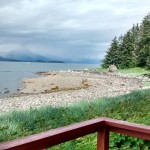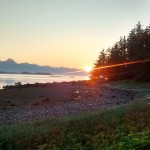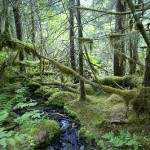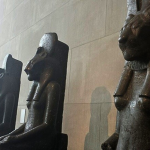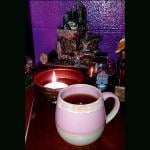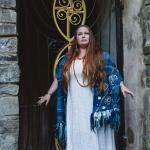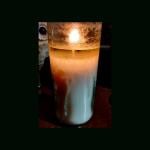My two most favorite books about magic aren’t explicitly about magic at all. One is a philosophical work in the ‘deep ecology’ vein, the other is a young adult book about Vikings and Saxons.
In this post I’ll review (oh, who am I kidding? I’ll praise) David Abram’s The Spell of the Sensuous. I first learned of this book three years ago, during my first autumn in Wales. My friend, Haloquin, loaned it to me. I was thick into my PhD studies, so I did a ‘grad school skim.’ I loved it and knew it was a book I’d come back to. Fast forward to my Place quarter and I wanted to re-read and review this book for that quarter. However, the book is so lush, so dense, so thought-provoking, and I have so few long, uninterrupted reading moments, that it has taken me the better part of four months to finish it. It’s not a long book: about 300 pages with extensive notes. It’s not you, book, it’s me being the parent of small children.
The Spell of the Sensuous is a book to savour, to read in sections and then ponder while you do the dishes, sit under a tree, or walk around your neighborhood. It’s a book whose ideas about connection, listening, reciprocity, and relationship demand meditation.
The basic gist of the book is this: language and the written language has separated us from being in relationship with the land and other living things; our surroundings do communicate with us, but we have come to privilege only a few ways of knowing, learning, and communicating, and are therefore shut off from the wisdom that is all around us. This leads us to devalue the natural world and inevitably run roughshod over it, in extreme cases silencing the Land permanently.
Humans are story tellers. We long to communicate and be heard. Oral cultures tell stories in certain ways, and while we are no longer an oral culture, we continue to tell stories all the time. We use movies, novels, television, and blogs to tell each other stories, to tell our own stories. We use fandom and social media to bond over and engage with these stories. Our religious systems use stories too (narrative theology), whether that’s to help us feel part of something bigger and more timeless, or to control us and keep up in check.
Abram presents us with an idea that the Land tells stories and humans participate and engage in those stories through creation tales, the cycles of seasons, the ebbs and flows of tides, populations, and epic life events. The Land becomes a container: a moral, communal, temporal, as well as physical container for communities. Abram cites many examples from many different kinds of oral cultures. I find it fascinating to see how modern society tries to recreate the same things, only using different methods.
That’s the larger scale. On a smaller scale, we seem to have lost the art of observation. We forget that a patient and skilled eye can notice incredible subtleties. This is part of wisdom. Careful gardeners might learn from experience which fertilizer works best in their particular soil, which flowers draw the bees, might start to learn the cycles of flowers and birds in ways that books can’t teach. Some one who is outside a lot can learn to anticipate rain long before the clouds roll over and drops fall – just from the shifts in the air. This is a form of communication. Realizing that we are in relationship with everything – I touch an ant, it senses me, I sense it – isn’t to make the non-human world into gods (although you can go ahead and do that, and I think this book will give you fodder for it). It is merely to realize that other living things sense and respond to us, just in different ways than we perceive.
And that very perception is at the heart of magic! Do we have ears to hear? Eyes to see? I’m guessing most of us could use some sharper ears and eyes – I know I do. How can we hone our sense and spirits to perceive the magic that is all around us? For those of us that do believe in gods, might not they be trying to communicate with us, but we’ve just gotten dulled? Unable to see them or hear them as clearly as we could?
For those of you with little patience for eco-apocalyptic tales, have no fear, this is not one of them. It does create a sense of urgency to engage with the world and live WITH the Land and all non-human creatures, as opposed to OVER and AGAINST the Land. What I walk away with is a beautiful, sensuous encouragement to listen, to look, to feel, to engage with the wider world around me, to “reinhabit” my surroundings. It makes me pained for the all too loud hum of my refrigerator and the neighbors’ perpetual too bright porch light.
This is not a religious or spiritual book. It’s not an academic book either, even though Abram has used phenomenology, a branch of philosophy, as his methodology. You could skip those sections and still get a lot out of this book. Abram does not present himself, nor even come across as, a religious person in any tradition. Yet he finds a sense of the numinous in the wider world, and this work speaks so deeply of magic that I cannot help thinking ‘yes, this!’ over and over again, even in a magical, spiritual context.
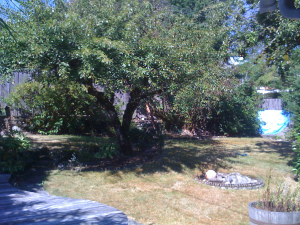
This is a book that sits on my desk, asking me to pick it up and reread sections. I have several other blog posts stewing my head, based on passages from this book! I cannot recommend this book enough. Want to jump start your magical practice? Want to shake up your usual way of thinking? Want to go deeper? Read The Spell of the Sensuous. Are you not spiritual or magical (or don’t consider yourselves such) but just want a beautifully written, philosophical book to explore a new way of thinking about our surroundings? Read this book.
I am reminded over and over again how profound it is to listen, to observe, to just be with what is around me. This book makes me want to go hiking, to go out into the fjords of SE Alaska again, but it also makes me want to sit out in my backyard and listen to the bugs and trees and birds. And to get dirty. To be more in touch with my primal, non-verbal self. I’m certain the gods approve.
